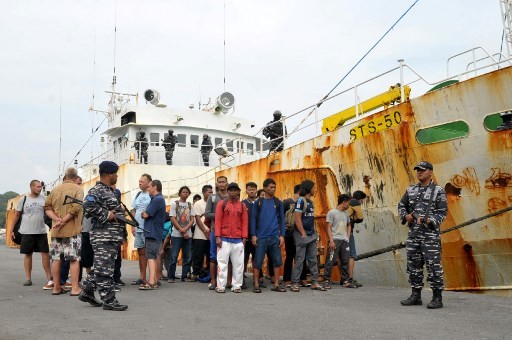Popular Reads
Top Results
Can't find what you're looking for?
View all search resultsPopular Reads
Top Results
Can't find what you're looking for?
View all search resultsIndonesia hails adoption of UN seafarer resolution
Change text size
Gift Premium Articles
to Anyone
I
ndonesia hailed the adoption of a United Nations General Assembly (UNGA) resolution on seafarers last week as part of efforts to establish international norms on the protection of citizens working on foreign vessels. But concerns remain as the maritime country has yet to ratify another convention that would legally protect the workers.
Proposed by Indonesia, the nonbinding resolution on key worker seafarers was adopted on Tuesday by consensus, and addresses the challenges faced by seafarers as a result of the COVID-19 pandemic.
The resolution, which was sponsored by 71 UN member countries including Australia, Germany, the United States and Russia, was the first UNGA resolution regarding seafarers and the management of the global flow of goods.
Foreign Minister Retno Marsudi said the adoption of the resolution was important for Indonesia not only as the largest archipelagic country, but also due to the number of Indonesian citizens who work as seafarers, as Indonesia is the third-largest seafarer-sending country after China and the Philippines.
Based on data from the UN Conference on Trade and Development (UNCTAD), there are about 2 million seafarers in the world who work on more than 980,000 commercial vessels and transport more than 11 billion tons of global trade products.
Retno highlighted some of the important issues addressed in the resolution, such as defining seafarers as key workers. The resolution calls on governments and various relevant stakeholders to ensure the implementation of safety protocols for seafarers, including in the case of crew changes, travel facilitation, repatriation and access to health services.
“This is part of Indonesia's strategic steps to protect our crew members. Protection diplomacy not only ensures the protection of our crew members who are working on board ships, but also from the international norm-setting side at the UN,” Retno told reporters on Thursday.
She went on to say that in addition to protecting crew members, the initiative was also in line with efforts to increase international trade and smooth sea transportation, especially to drive economic recovery during the pandemic.
“At present, the shipping sector transports 80 percent of world trade products and plays an important role in facing the challenges of COVID-19, particularly in transporting medicines, medical equipment, food and other basic necessities,” she said. “Indonesia will continue to strive to ensure that this issue can be brought to the attention of multilateral forums, in line with Indonesia's national interests.”
International Maritime Organization (IMO) Secretary-General Kitack Lim said the key worker designation should ensure seafarers receive priority COVID-19 vaccination that would allow them to work and maintain vital global supply chains.
"I hope the key worker designation will ensure that seafarers can be vaccinated expeditiously. This will go some way to resolving the ongoing crew change crisis," Lim said as quoted from the UN body’s website.
Public calls for the protection of Indonesian seafarers were sparked earlier this year when a video went viral showing the burial at sea of an Indonesian crew member who allegedly endured poor working conditions aboard a Chinese fishing vessel.
Reports of a number of Indonesian crew members registered to Chinese longliner fishing vessels who died between December 2019 and April this year have exposed the lack of regulations that could have protected them and other migrant workers on the ship.
Foreign Ministry citizen protection director Judha Nugraha said the ministry and 129 missions abroad had handled around 1,000 cases related to Indonesian migrant workers in the fisheries sector this year, with 673 of them having happened to those who worked on at least 114 Chinese fishing vessels.
“Most cases involving Indonesian fishery workers concern unpaid salaries, excessive working hours, physical abuse, bad working conditions and burial at sea,” he said in a webinar organized by Greenpeace Southeast Asia on Thursday.
The webinar recommended a working paper on ratifying and implementing the International Labor Organization’s 2007 Work in Fishing Convention, or ILO Convention 188, which specifically regulates the protection of fisheries crews.
Greenpeace Southeast Asia researcher Tashryn Mohd Shahrin said countries in the region should begin talks to ratify and implement the convention to ensure the protection of migrant workers, including through ASEAN.
“The main provision here is to ensure decent working conditions for fishers aboard fishing vessels […] and also to enforce these measures and the other provisions to ensure owners that illegal and substantive issue operations will be marginalized,” she said.
However, Judha said, for such multilateral instruments there were still difficulties in terms of enforcement.
“We know that the number of states that have ratified ILO convention 188 is still very very limited. Only 18 countries have ratified this convention,” he said.
He said while the ILO convention could provide better protection for Indonesian migrant fishermen working on foreign fishing vessels, it would also create responsibilities for Indonesia to provide the same level of protection for fishers working on fishing vessels operating within Indonesia’s territorial waters, as well as the exclusive economic zone.
“So when we ratify this ILO convention, I suggest that we create a roadmap, because it will create responsibilities for Indonesia to also protect fishers working in Indonesia,” he said.










